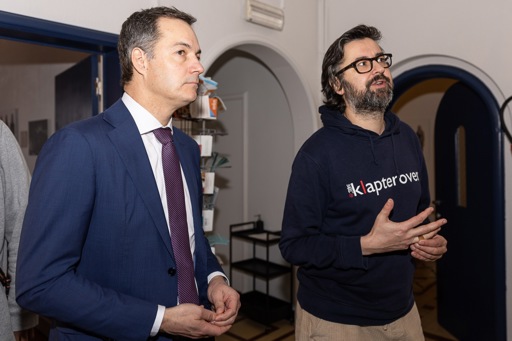The number of young people struggling with problems such as fear of failure, insecurity and depression is increasing, Prime Minister Alexander De Croo said after a working visit to an organisation that runs a network of homes where young people can go for free, discreet consultations.
“About half of young people don’t feel good about themselves. A lot more than before,” the Prime Minister said at the end of his visit to the TEJO Centre.
The first TEJO home was opened in downtown Antwerp in 2010. Now there are 19 in Flanders supported by 650 volunteers. During his visit, the prime minister was shown some therapy rooms and spoke with representatives of the organisation, who outlined the types of needs they note among young people and how they work.
“The problem has increased in recent years,” said the prime minister. “There are several reasons for this. The focus is often on COVID, but we live in a very different environment today, where people have less room to fail or do things differently. There is tremendous pressure on all of us, but with young people that has a different impact.”
Almost half of all 10-12-year-olds are stressed, experts say
Experts at TEJO used to see distress in 10%-20% of young people. Today, however, that has shot up to almost 50% in the target group of 10-to-12-year-olds.
“You can’t say such a thing is normal. If so many young people are in need of help, something fundamental is going on," De Croo said.
“Young people mainly tell us that they are stuck in a complex society, that a lot is happening and coming at them and that they don’t always know which the right path is to follow,” said TEJO president Koen Browaeys. “But they also experience a lot more.
A lot is being asked of young people
"The world has gotten bigger, and a lot of things are happening. They have more stress and anxiety issues. Young people look at the world, to some extent, in a very negative way.”
Browaeys sees a lot being asked of young people at school, socially and in their leisure experiences. Social media reinforces that. “Young people feel they have to be unique. Or have to be different. But also, that they have to constantly show that to the outside world. They get a little stuck in that.”
For young people with anxiety, questions or depressive feelings, it is best not to bottle them up, so they are welcome at the TEJO homes if family or friends do not have answers, Browaeys stresses. “Talk about it,” he advises. “A lot of people can offer a listening ear, and many are willing to do so. And try to be a bit of a listening ear yourself for other people.”
More communication needed
“Try to meet up with friends, have a drink and listen to young people," he continued. "As a parent, try to eat at the table and have a conversation about how the day has been.”
Browaeys also had a message for policymakers. “The main task is to give time and space to people. We ourselves are an organisation with 650 volunteers who choose to take on their roles in their limited free time. But you have to have the time, space and opportunities,” he explained.
“Time has become a very precious thing,” Browaeys noted. “When you see that people have to take a flexjob to pay for gas and electricity because of energy prices, there is less time and space to take on that role. And of course, there has to be continued investment in professional care from the government.”

